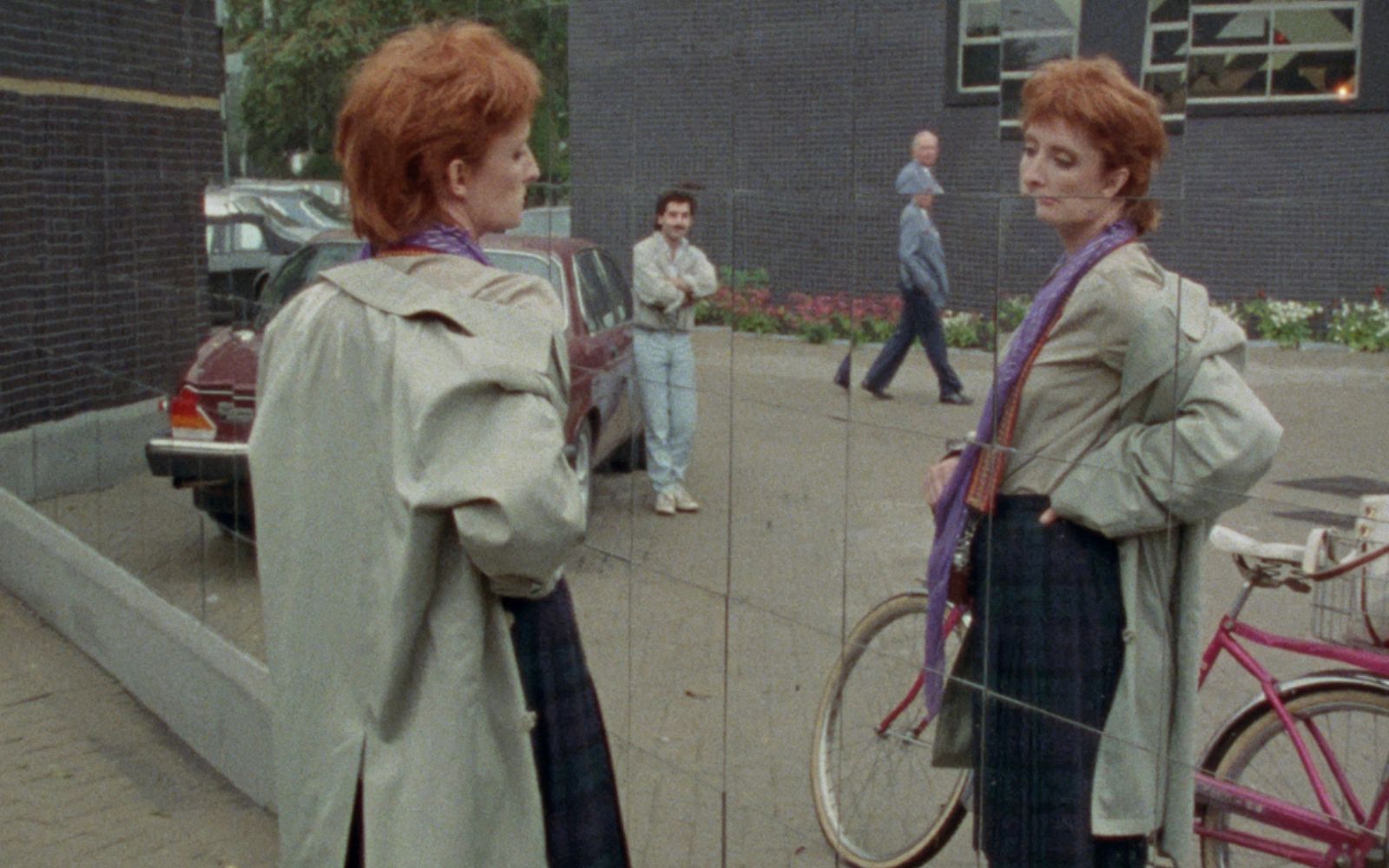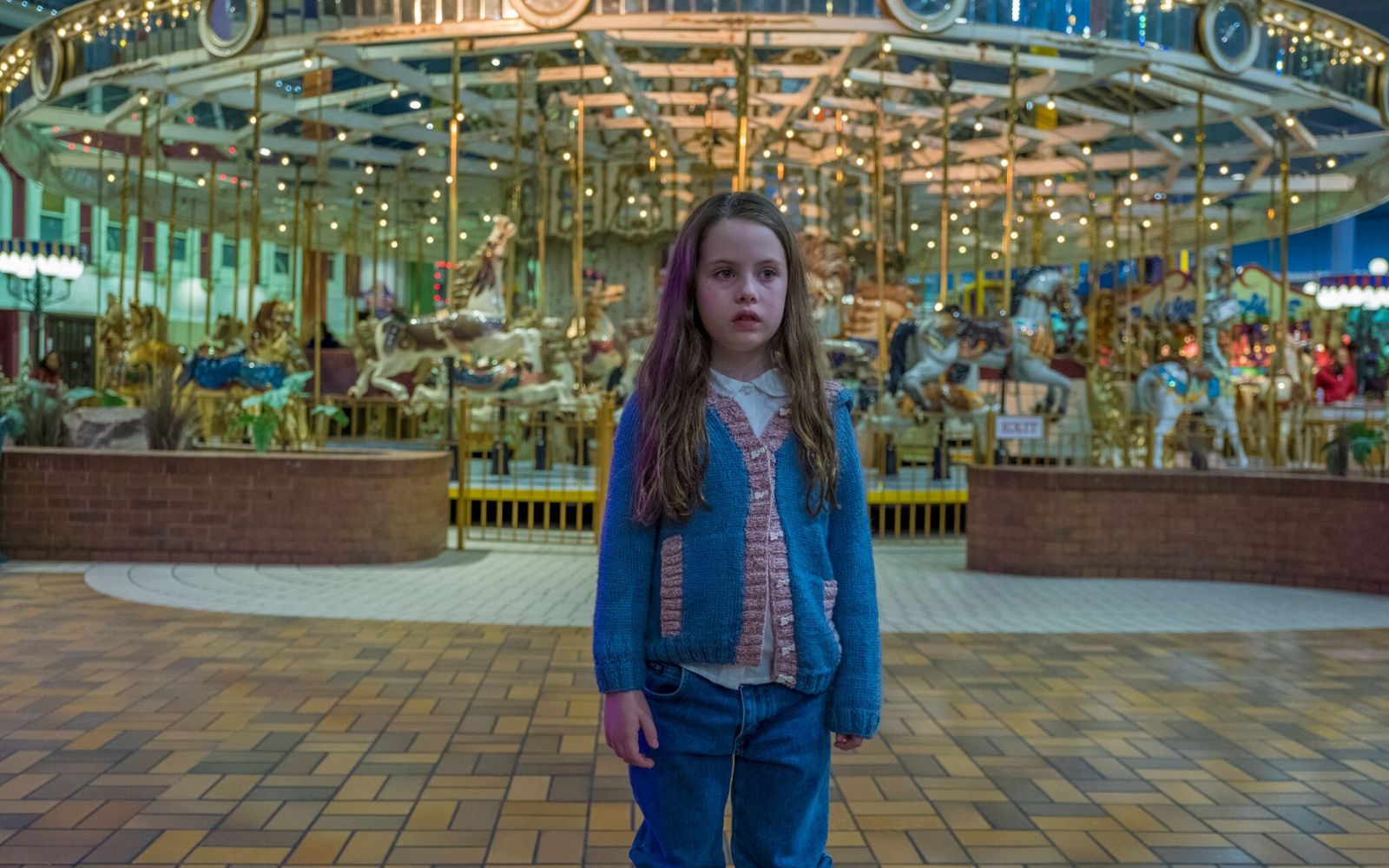
Playing in the Sandbox with Patricia Rozema
The Toronto-based filmmaker discusses solitude, pleasure, and the queer continuum ahead of spotlight at TIFF Lightbox.
by Maggie McPhee
- Published on
The first few minutes on Zoom with Patricia Rozema could belong in her oeuvre as a short film. She exudes kindness and curiosity, and a sense of absurdity charges the air. She puts two thumbs up and facial recognition software sends pixelated fireworks off in the background. Laughing, she forms a heart with her hands and cartoon versions balloon into the atmosphere. Then, she gets a call: her dishwasher isn’t working and the repairman is here. All the while the scene unfolds in the astonishing architecture of her apartment, a floor-to-ceiling wall of books connected to a row of columned archways. This microcosm contains the dualities that define her movies — between fantasy and reality, function and futility, connection and chasms, profundity and play.
When we finally start the interview I blab on and on, then stammer when I realise I shouldn’t be the one talking. “This is a violation of the form,” she says with a smile. “That’s my specialty. Subvert the genre.”
And in the eight feature films Rozema has made in the last 35 years, she has upended an impressive array: the voyeuristic murder mystery, the post-apocalyptic survival thriller, the erotic drama, the period piece, the children’s movie. What’s more, she folds that same breadth into every film. Her sophomore feature, White Room (1990), weaves fairytale, crime grit, video art, surrealism, sensuality and camp. Pushing further, she can distil these multitudes into a single image. One, for example, of a character’s home, a trailer parked at the dump, framed by two prodigious mounds of ash, their symmetry reflected in a pool of waste water, all encased by an unreal blue sky. It’s a moment so beautiful and ugly and unusual that you can’t believe your senses.

White Room (1990)
Rozema cultivated this scope through solitude. Raised by a first-generation Dutch Calvinist family and educated through the Christian school system, she endured her childhood and adolescence without once encountering an artist. The day a college philosophy professor took her to see Ingmar Bergman’s Persona and Face to Face was the day everything changed.
“I sat through the double bill and then sat through it again to decode it, to kind of untangle it, to solve it somehow — and of course you can’t, which is the beauty of it,” she says. “I didn’t think for a second I would make something like that. I just knew that I loved it.”
As a queer artist, Rozema cut all ties to her misogynistic, homophobic and conservative Calvinist community. At 21, she embarked into her future. “I thought: the only way I’m actually gonna be able to rebirth myself and be someone I want to be and not be awash in self-loathing or having to defend myself all the time is to just start over,” she shares. “So I started over.”
Rozema worked as a journalist to pay the bills and wrote scripts on the side. She was fired from the CBC. Her first six screenplays were denied funding. Alone and unaccepted, she dove deeper into herself, and the deeper she went, the more life she discovered. And like a collapsing star, she resurfaced as a supernova. “I think that’s why so many artists are outsiders,” she says. “You don’t expect the approval, so you don’t try for it, and then you’re just honest and that’s what people respond to.
“It was a sense of complete isolation that gives confidence,” she adds. “Maybe if I’d gone to film school, I would have been cowed by the greats. Maybe if I thought anyone was gonna see [my first film], I would have been nervous.”

I’ve Heard the Mermaids Singing (1987)
Her debut feature I’ve Heard the Mermaids Singing isn’t just one of the most widely seen Canadian works; in 1987 it became the first English-language Canadian film to win an award at the Cannes Film Festival — the Prix de la Jeunesse, a now-defunct award for young filmmakers; it marks one of a handful of national movies to actually make money at the box office; and it sits on TIFF’s list of the 10 best Canadian films of all time.
Rozema learned a crucial lesson when, at 25, she toured her first short film through the festival circuit. Passion: A Letter in 16mm received both “the worst review” she has ever read and an award at the Chicago Film Festival. “I thought: ‘Oh, so nobody knows anything.’ So the trick is just to get enough approval and enough money to keep going and wouldn’t this be the best life in the world. Because I’m never happier than when I’m in — I call it the sandbox — just playing and putting this picture with that sound,” she says.
Maintaining that balance, Rozema has nurtured her self-expression in a notoriously expensive medium, and audiences have been ever enriched by her efforts. Her magical sandbox houses a cast of never-before-seen characters, ecstatic formal innovations and a buffet of erotic identities. “I was speaking about a continuum long before a continuum was popular at all and I experienced some rejection from organised queer identity police,” she shares. “That was confusing as well, because aren’t we about accepting the thing that’s not the norm?”

Mouthpiece (2018)
Rozema emerged amid the Toronto New Wave movement, a group of filmmakers including Atom Egoyan and Bruce McDonald whose work distinguished itself on the international scene in the 80s and 90s for its experimental investigations into themes of identity and belonging. Even as the only woman director working in that milieu, her oeuvre stands apart in its artistry, inventiveness, and disavowal of filmmaking conventions.
She attributes their success to certain visionary executives in Telefilm and the Ontario Film Development Corporation (now Ontario Creates). Those at the top rewarded boldness and financed creatives who wanted to reinvent the wheel. “I am completely a product of the grant system,” she says. Today, those visionary executives are few and far between.
“In Canada we’re never gonna be able to compete with the Americans because they have such complete control over the mainstream.”
— Patricia Rozema
“Let artists be artists,” she continues. “In Canada we’re never gonna be able to compete with the Americans because they have such complete control over the mainstream. So let them have the mainstream and we’ll invent.” Her point holds water. Canadian directors who enjoy international acclaim are virtually all outsider auteurs.
From the start, Rozema anchored her pursuits in authenticity. She walked away from lucrative opportunities because they compromised her independence. She’s protective of that place of pleasure, a guardian on the edge of the sandbox, seeking freedom to play, be herself, and shepherd an idea into existence. “I assume my right to tell a story,” she says. “I might not intellectually understand what I’m doing, but I know why I had that feeling and it needed to be transformed into this form. It’s a salvation. It’s a place of escape. It’s a place of transcendence.”
TIFF Lightbox has programmed a spotlight of Patricia Rozema’s work, A Certain Slant of Light: The Films of Patricia Rozema. The special series runs through March and Rozema will be in person for select screenings, including for her own programmed film, Ingmar Bergman’s Persona.
Screening times:
Mansfield Park | March 1, 6:30pm
Into the Forest | March 7, 6:30pm
Mouthpiece | March 10, 6:30pm
I’ve Heard the Mermaids Singing | March 17, 3:30pm
White Room with Patricia Rozema | March 22, 6:30pm
When Night Is Falling with Patricia Rozema | March 23, 6:30pm
Grey Gardens with Patricia Rozema | FREE | March 24, 4pm
When Night Is Falling | March 26, 6:30pm
*Persona with Patricia Rozema | March 23, 3:30pm
By Glenn Alderson
A deep-listening session reveals how Apple Music’s sonic innovation reshapes the way we hear.
By Cam Delisle
Dominic Weintraub and Hugo Williams take audiences on a treadmill-fueled ride through the chaos and hope of modern life.
















